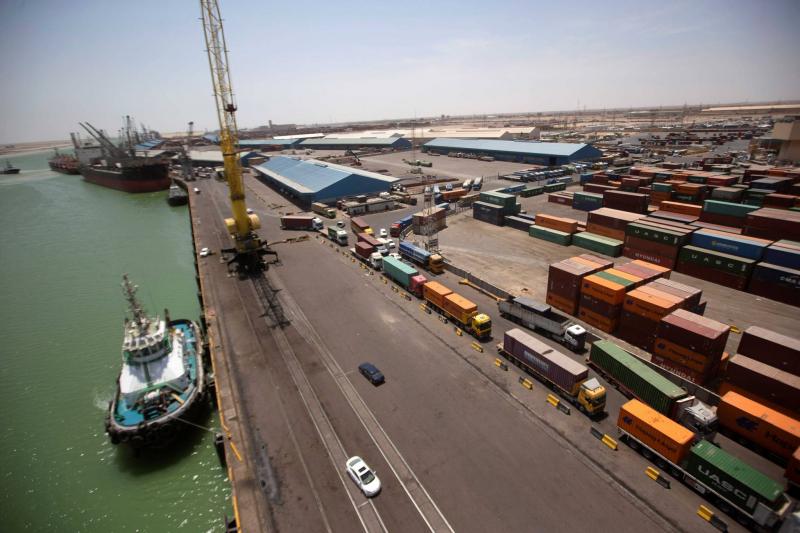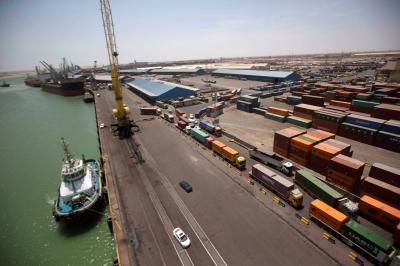The Iraqi Ministry of Transport has revealed a maritime plan to build 13 cargo ships in 2024 to transport goods needed by Iraq and to support the country's economy. This move is part of a strategy to expand the Iraqi maritime transport fleet, both commercial and oil tankers, following the destruction of its commercial ships and oil tankers due to wars, particularly the Gulf War after the invasion of Kuwait in 1990 and the subsequent sanctions imposed by the Security Council in 1991.
Iraq had owned 17 commercial ships with varying capacities for transporting goods at the end of the 1980s; however, it currently has six commercial ships, most of which were purchased after 2003. Among these, three have a capacity of 14,000 tons: Al-Basra, Al-Muthanna, and Al-Hadba, which operate in international waters outside Iraqi territorial waters for transporting various cargoes. Additionally, there are two smaller vessels functioning in the territorial waters to supply incoming ships at Iraqi ports with fresh water and fuel, along with the Baghdad ship, which has a capacity of 10,000 tons for transporting various containers.
According to a statement from the Ministry of Transport, "The General Company for Maritime Transport intends to develop the operation of the maritime fleet by building new ships." The plan includes "building several large-capacity vessels to meet the country's needs for transporting supplies covered by the ration card and goods supporting other sectors in all ministries and companies operating in the country, contributing to the support of the Iraqi economy."
Director General of Maritime Transport, Ahmed Jassim Al-Asadi, stated that "the company has begun the process of obtaining the necessary approvals to build eight ships, six of which will be part of the investment budget, and two from the operational budget, along with five additional ships for which communications have been made regarding their construction through a Japanese loan granted to Iraq."
New Oil Tankers
It appears that Iraq intends to expand the construction of a fleet to transport both goods and crude oil. In late 2022, the Iraqi Oil Minister Hayan Abdul-Ghani announced a plan for the Ministry of Oil to build oil tankers, and indeed a group of tankers has already been constructed. The oil tanker fleet reached its peak in 1982 with a total of 24 vessels but was destroyed in 1990. In 2007, four tankers with a capacity of approximately 13,000 tons were purchased to build a new fleet, which was later reinforced by a newly acquired tanker from China with a capacity of 31,000 tons named "Sumer." Iraq is also awaiting the arrival of three new tankers, two of which have been contracted with Norway.
Additional Revenues
Economist Safwan Qusai pointed out that investment in the maritime transport sector will bring additional revenues to Iraq, especially after the establishment of the Faw Port. He emphasized the importance of building a large fleet of ships. He added, "Iraq needs investment to develop the shipping industry in the marine and land transport sectors, and building ships will create job opportunities and also bolster the Iraqi economy," noting that the land of the two rivers needs to build commercial ships as well as giant oil tankers, given that its existing ships date back to the early 1970s and 1980s.
He mentioned that the new ships would be responsible for transporting Iraqi oil across the seas, and that the transition of global trade to Iraq necessitates a commercial fleet capable of transporting various types of goods, which would enhance the insurance sector for imported goods that benefit Iraq and facilitate the transport of its goods to Europe and Asia.
He pointed out that "investing in maritime and railway transport requires a system to manage this investment file with artificial intelligence to make transportation an attractive factor for Iraqi territories at reduced prices." He emphasized the importance of building a large fleet of ships, especially since Iraq intends to establish the largest steel company in Basra, along with an industrial city, which may shift Iraq from purchasing ships to building them after the expansion of the maritime transport sector.
Regarding his expectations of the origins of the commercial ships to be built for Iraq, Qusai said, "The new ships may be constructed in the United States or Germany, but certainly, Iraq will search for the best opportunities and will create partnerships with all countries in the world." He added that Iraq imports goods worth $50 billion using non-Iraqi ships and tankers, and possessing its own means of transportation will boost Iraqi insurance companies, especially as the country prepares for 15% of the volume of Iraqi trade to pass through the land of the two rivers.
Experts in maritime transport state that the construction time for commercial ships depends on their size, ranging from two to five years, during which Iraqi crews capable of operating those ships can be trained.
Cost Reduction
Iraq had the first commercial fleet at the beginning of the republican era in 1958 after acquiring two cargo ships, each with a capacity of 6,000 tons. Following 1968, there was an expansion of the commercial maritime fleet with the purchase of four Russian-made ships, each with a capacity of 13,600 tons. Between 1976 and 1977, the company received four ships that it had contracted to build with a German company, and it also contracted with a Japanese company to build four ships that entered service in 1977, bringing the total number of Iraq's fleet to 14 ships. In the 1980s, three specialized vessels were added to the commercial maritime fleet; however, the maritime transport sector was affected by the Iran-Iraq war due to the halt of Iraqi ports' activities, and it faced total paralysis due to the economic sanctions imposed by the UN Security Council on Iraq in 1991, which halted the activities of Iraqi vessels on international and regional shipping lines.




